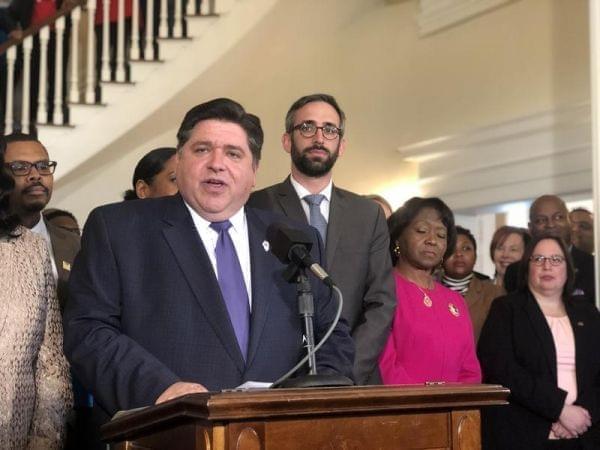Gov. J.B. Pritzker Signs $15 Min. Wage Increase Into Law

Illinois became the first state in the Midwest Tuesday to increase the minimum wage to $15 an hour. Democratic Gov. J.B. Pritzker signed the measure at the Governor’s Mansion in Springfield. Daisy Contreras/NPR Illinois
Illinois became the first state in the Midwest Tuesday to increase the minimum wage to $15 an hour. Democratic Gov. J.B. Pritzker signed the measure at the Governor’s Mansion in Springfield.
The plan calls for $15 an hour by 2025. It’s the first increase to the statewide minimum wage since 2010. Minimum wage workers will begin to see changes in 2020, when the current wage of $8.25 will increase to $9.25. By July of that same year, the amount will increase to $10 an hour. A $1 increase will take effect every year until 2025.
Pritzker said the pay boost will have broad benefits, including helping 1.4 million people who currently earn less than $15 an hour. “The accomplishment here is nothing more and nothing less than historic," he said. The Democratic governor campaigned on the issue and said it was time for an increase to happen.
State Sen. Kimberly Lightford, a Maywood Democrat, spearheaded the proposal for several years. "I've been trying to get this done for almost ten years and the governor gets it done in 30 days."
She said the law is only a first step to help people get out of poverty.
Several business groups opposed the plan, but proposed a regionalized approach based on cost of living. Many cited concerns of being unable to sustain small businesses in areas outside of Chicago, where cost of living is lower. The final measure did not include a tiered-approach.
To address those concerns, advocates say the law includes tax credits for businesses with 50 or fewer employees. The credits will be available starting in 2020, scaling back every year until phasing out in 2025.
Pritzker said he will continue to work with employers and Republican legislators to ensure businesses successfully implement the new wage. He said he has plans to help grow the economy and create jobs in downstate "communities that were left out, left behind".
Links
- Governor Hails Passage Of Bill To Raise Illinois Minimum Wage To $15 By 2025
- Business Owners Want Different Approach To Minimum Wage Plan
- $15 Minimum Wage Clears Senate, Heads To House
- Minimum Wage Discussions Continue In Illinois Senate
- $15 Minimum Wage Talks Begin In Springfield
- Gov. Rauner Veto Stalls Fight For $15 Minimum Wage
